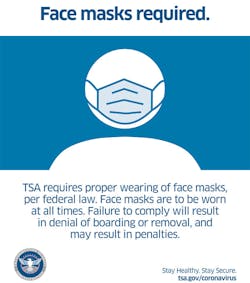At 11:59 p.m. on Feb. 1, a federal mask mandate requiring face coverings be worn while at transportation hubs and on conveyances went into effect. The nationwide rule began with an Executive Order from President Joe Biden and is being supported by an order from the Centers for Disease Control and Prevention (CDC) and a directive from the Transportation Security Administration.
Many transit systems, even in states and municipalities where a mask directive did not exist, have required mask usage of passengers for months prior to the mandate taking effect. However, the challenge of how to enforce such a mandate remains. A recent House Committee on Transportation and Infrastructure hearing on Feb. 4, “Protecting Transportation Workers and Passengers from COVID: Gaps in Safety, Lessons Learned and Next Steps” gave a spotlight to this role of operators as “mask police.”
The hearing included testimony from Ismael Rivera, bus operator for Lynx and member of Amalgamated Transit Union (ATU) Local 1596, Orlando, Fla., who provided nine recent examples of transit operators in the U.S. who were attacked for asking a passenger to don a mask.
“When someone boards one of our buses without a mask, we are faced with a tough choice: say nothing and risk that an infected rider will spread the virus or tell the passenger to put on a mask and risk a violent reaction,” Rivera included in written testimony. “When you confront someone, it can escalate quickly. He could spit on you, he could throw something at you or he could hurt another passenger. But what if that person is sick and contaminates everyone on this bus? And you could have prevented that?”
Rivera’s testimony illustrates a much larger ethical challenge of self-preservation versus the common good operators face each time a maskless passenger boards a vehicle. What would you do? Would your action be the same the first time it happened versus the 150th time?
Requiring the use of masks on public transportation networks was a good move, but more needs to be done to support the individuals operating these modes of transport.
As House Transportation and Infrastructure Committee Chair Peter DeFazio (D-OR-4) said during his opening statement at the same hearing, “We owe all of these workers a debt of gratitude for their commitment and their courage for showing up for their jobs every day to move America.”
About the Author

Mischa Wanek-Libman
Group Editorial Director
Mischa Wanek-Libman is director of communications with Transdev North America. She has more than 20 years of experience working in the transportation industry covering construction projects, engineering challenges, transit and rail operations and best practices.
Wanek-Libman has held top editorial positions at freight rail and public transportation business-to-business publications including as editor-in-chief and editorial director of Mass Transit from 2018-2024. She has been recognized for editorial excellence through her individual work, as well as for collaborative content.
She is an active member of the American Public Transportation Association's Marketing and Communications Committee and served 14 years as a Board Observer on the National Railroad Construction and Maintenance Association (NRC) Board of Directors.
She is a graduate of Drake University in Des Moines, Iowa, where she earned a Bachelor of Arts degree in Journalism and Mass Communication.

